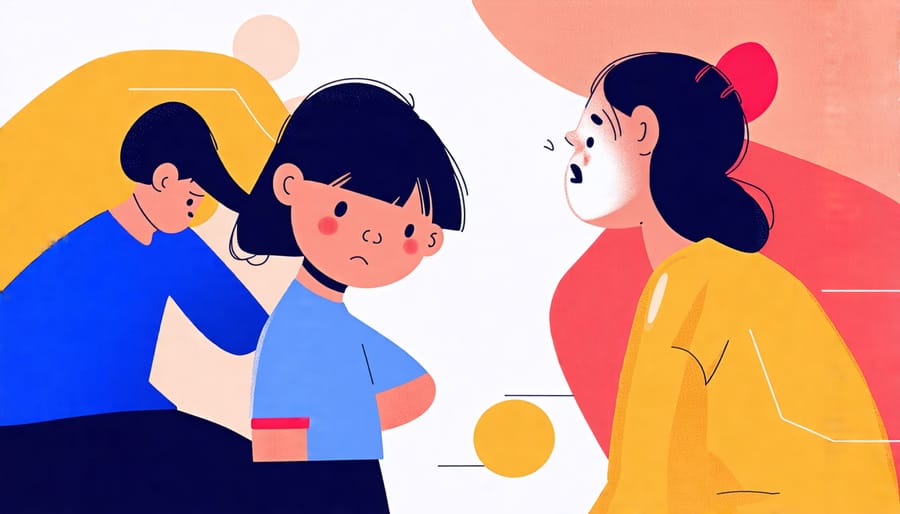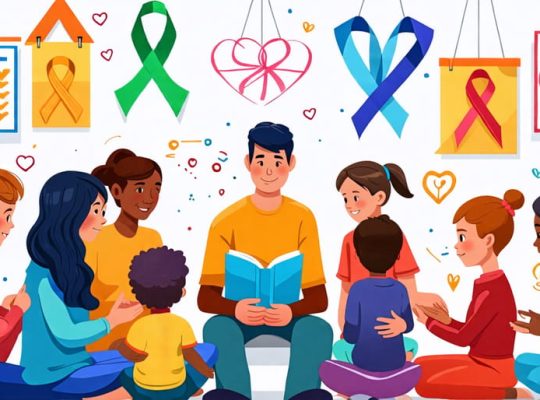Recognize the early signs of Complex PTSD in children, such as difficulty managing emotions, persistent sadness, and relational challenges, and seek professional evaluation promptly. Cultivate a supportive environment by maintaining open communication, validating their feelings, and ensuring a safe space for expression. Collaborate with mental health professionals to develop an individualized treatment plan that may include therapy modalities like Cognitive Behavioral Therapy (CBT) or Eye Movement Desensitization and Reprocessing (EMDR), tailored to the child’s needs. Prioritize consistent self-care to model healthy coping mechanisms and enhance your ability to support the child effectively on their healing journey.
What is C-PTSD?
Complex PTSD, or C-PTSD, is an intricate mental health condition that can develop in response to experiencing prolonged or repeated trauma, particularly during childhood. Unlike standard Post-Traumatic Stress Disorder (PTSD), which is often linked to a single traumatic event, C-PTSD stems from sustained exposure to trauma, such as ongoing abuse, neglect, or witnessing violence over a long period.
Children are particularly vulnerable to C-PTSD, as their brains are still developing and they may not have the necessary coping mechanisms to process such overwhelming experiences. This condition is not just about fear and anxiety—children with C-PTSD may struggle with a sense of self and stability in relationships. They might experience difficulties in regulating emotions, leading to feelings of helplessness, guilt, shame, or worthlessness. Additionally, they could have a distorted perception of perpetrators and may feel powerless or unable to escape their situation.
It’s crucial for parents, teachers, and healthcare professionals to recognize these symptoms early. Understanding C-PTSD can make a significant difference in a child’s life by promoting timely intervention and appropriate therapies. Empathetic support and informed guidance can help these children rebuild their sense of safety and trust in the world around them. In seeking to support a child with C-PTSD, the pathway to healing often involves therapy tailored to their specific experiences, fostering resilience and providing a nurturing environment where they can thrive despite past adversities.
Signs and Symptoms of C-PTSD in Children

Emotional Symptoms
Children experiencing Complex PTSD, or C-PTSD, may undergo a range of emotional symptoms, often feeling overwhelmed by chronic anxiety, fear, and deep sadness. These emotions can be a response to prolonged trauma, making everyday situations feel daunting or even threatening. Parents and teachers might notice children becoming easily agitated or withdrawn, struggling to find joy in activities they once loved. Consistent fear can lead to hypervigilance, where children are constantly on edge, as if waiting for something bad to happen. It’s essential to approach these symptoms with empathy and understanding, as early recognition and support can significantly improve a child’s well-being.
Behavioral Symptoms
Children with Complex PTSD (C-PTSD) may exhibit a range of behavioral symptoms that can impact their daily lives. One common change is withdrawal, where a child may avoid social interactions or activities they once enjoyed. This withdrawal can stem from feelings of shame or a fear of new experiences. On the other hand, some children might show aggression, feeling overwhelmed by their emotions and lashing out as a means of coping. Finally, developmental delays can occur, as the stress associated with C-PTSD may hinder cognitive and emotional growth. Understanding these behaviors allows parents, teachers, and healthcare professionals to provide the right support to help the child heal.
Cognitive Symptoms
Children experiencing complex PTSD may face various cognitive challenges, making everyday tasks difficult. They might struggle to concentrate in class, find it hard to remember lessons, or even feel overwhelmed when trying to learn new information. This can sometimes lead to frustration, both for the child and those around them. By recognizing these cognitive symptoms early, parents, teachers, and healthcare professionals can play a crucial role in supporting the child’s learning journey. Simple approaches like breaking tasks into smaller steps, providing a quiet space for concentration, or using visual aids can make a significant difference. With understanding and the right support, children can navigate these challenges and thrive.
How C-PTSD is Diagnosed
Clinical Assessment
When assessing Complex PTSD in children, it’s essential to use a comprehensive approach that considers the child’s specific experiences and symptoms. Typically, an evaluation begins with a detailed clinical interview conducted by a mental health professional who specializes in trauma. This interview aims to gather a complete understanding of the child’s background, including any traumatic events and the impact on their emotional and social development.
In addition to interviews, professionals may use standardized assessment tools tailored for children, such as questionnaires and checklists. These tools are designed to capture the nuanced symptoms of C-PTSD, which can include emotional dysregulation, negative self-perception, and difficulty forming relationships. By integrating these tools, clinicians can paint a fuller picture of a child’s mental health.
The assessment process also involves discussions with parents, teachers, and, when appropriate, the child. These conversations help to understand the behavior in various settings, providing insights that are crucial for a proper diagnosis. Through a compassionate and supportive approach, professionals can guide children and families toward understanding and healing, making early diagnosis and intervention pivotal.

Role of Parents and Caregivers
Parents and caregivers play a crucial role in supporting the diagnosis of Complex PTSD (C-PTSD) in children. Their unique perspective and insights can make a significant difference in identifying C-PTSD symptoms early on. By providing detailed and compassionate accounts of a child’s behavior and emotional state to healthcare professionals, they can ensure that all relevant information is considered in the diagnostic process. Observations such as sudden mood changes, withdrawal from social interactions, or extreme reactions to certain situations can be vital in piecing together the child’s experience.
Personal stories from parents who have navigated this journey reveal the importance of a trusting relationship with healthcare providers. It’s essential for parents and caregivers to feel heard and for healthcare professionals to offer a supportive environment where concerns can be openly discussed. Their observations can help clarify the child’s needs and contribute to creating a tailored treatment plan. Through active involvement and advocacy, parents and caregivers can empower their children on the path to healing and recovery.
Treatment and Support Options
Therapeutic Approaches
When it comes to treating C-PTSD in children, there are several compassionate approaches to consider. One effective method is cognitive-behavioral therapy (CBT), which helps children understand and change the thought patterns that contribute to their distress. Another engaging option is play therapy, especially valuable for young ones who communicate their feelings through play rather than words. This therapeutic approach allows children to express themselves in a safe environment. Eye Movement Desensitization and Reprocessing (EMDR) is also noteworthy, as it helps children process trauma through guided eye movements, reducing its psychological impact. Each child is unique, and these therapies are tailored to nurture healing, promoting a pathway to emotional well-being and resilience.
Family Involvement
Navigating a C-PTSD diagnosis is challenging, and family involvement can be crucial in the healing journey. When families come together, they provide a foundation of understanding, love, and support that is essential for recovery. Educating family members about C-PTSD helps them comprehend the struggles their loved one faces, fostering empathy and patience. Engaging in family therapy can strengthen relationships and improve communication, ensuring everyone feels heard and valued. By creating a safe and nurturing environment, families empower individuals to work through their traumatic experiences at their own pace. Remember, the healing process benefits greatly from the collective effort, as each family member plays a vital role in fostering resilience and well-being.

Personal Stories and Expert Insights
When Lisa noticed her 8-year-old son, Jake, withdrawing from activities he once enjoyed, she felt concerned but unsure of the cause. After sleepless nights and endless research, she stumbled upon an article about Complex PTSD, or C-PTSD, which resonated with her experiences. Reaching out to a compassionate therapist, Lisa learned that C-PTSD can arise from chronic exposure to stress or trauma and often manifests in children who struggle with emotional regulation and maintaining trust in relationships. For Jake, therapy involved not just addressing past traumas but also equipping him with tools to navigate his emotions safely.
Lisa’s story is just one example of many families learning to understand and support children dealing with C-PTSD. Dr. Emily Tran, a well-regarded child psychologist, emphasizes the importance of early diagnosis, stating, “Early intervention can drastically alter a child’s developmental path, allowing them to heal and build resilience.” She advises parents and educators to look out for signs of ongoing anxiety, hyper-vigilance, or sudden behavioral changes, as these may indicate a deeper underlying issue like C-PTSD.
Professionals like Dr. Tran also stress the role of a supportive environment. Creating a space where children feel safe and heard can be crucial in their healing journey. Teachers can play a vital role by being attentive to behavioral cues and fostering inclusivity in the classroom. Through sharing personal stories and expert insights, we can create a community that supports children like Jake in overcoming the challenges of C-PTSD, reinforcing the idea that they are not defined by their past experiences but by their potential for healing and growth.
Conclusion
Recognizing and supporting children with C-PTSD is crucial for their mental health and well-being. Early awareness allows for timely interventions that can significantly improve outcomes and help children lead fulfilling lives. Parents, educators, and healthcare providers play vital roles in identifying symptoms and fostering a supportive environment. By working together proactively, we can ensure children receive the understanding and care they need. Sharing stories and knowledge normalizes the journey and aids in recovery. Remember, each small step of support is a step towards healing, creating a brighter future for all children affected by C-PTSD.







